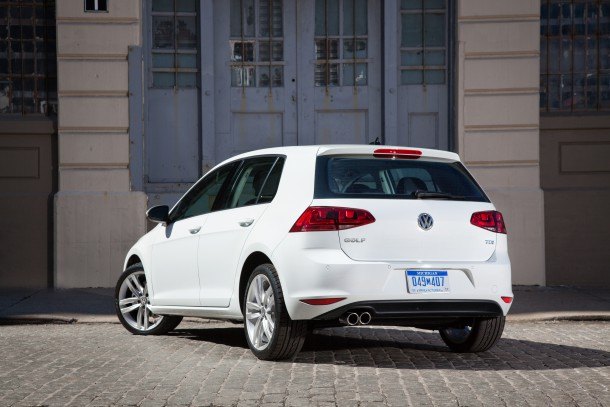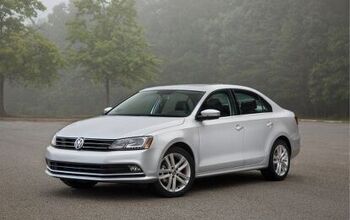Did Volkswagen USA Sales Really Increase In September? Sort Of
Twelve days after early reports revealed that Volkswagen Of America’s TDI Clean Diesels weren’t so clean after all, Volkswagen reported a one-percent U.S. sales increase for the month of September 2015, the month in which the emissions fraud was revealed.
But did Volkswagen’s U.S. volume truly rise? And if so, what kind of extra volume is generated by a one-percent uptick? Moreover, while Volkswagen trickled forward with just its fourth year-over-year U.S. monthly sales improvement in 2015, what was the rest of the auto industry accomplishing?
First, consider the length of the month. September 2014 featured 24 selling days and did not include sales from the high-volume Labor Day weekend, which was tallied with August results in 2012, 2013, and 2014. September 2015, on the other hand, featured 25 selling days and did include those Labour Day weekend sales. As a result, the year-over-year comparison — always used because of the seasonality of new vehicle sales — isn’t a perfectly sound tool in this particular instance.
This is where the daily sales rate, or DSR, comes into play. In September 2014, Volkswagen Of America sold 1,083 new vehicles per selling day. In September 2015, while the total monthly volume Volkswagen reported was higher by 0.56 percent, or a scant 145 units, the DSR fell to 1,046 new vehicles per day, a 3.3-percent decrease.
Even the DSR, however, doesn’t take into account the extra surge created by Labor Day weekend volume, but the health displayed by the overall industry’s sales provides some clarity on that front. From an auto sales perspective, September 2015 was 4.2-percent longer than September 2014, yet the auto industry generated 16-percent more new vehicle sales. The overall industry’s DSR rose 11.1 percent to 57,685 units, quite obviously far in excess of VW USA’s 3.3-percent decline.
Yes, on the surface, Volkswagen’s U.S. volume increased in September 2015, albeit marginally, but the rate at which Volkswagen was actually selling cars decreased in September. Plus, Volkswagen’s modest volume increase/slight DSR decrease occurred as the auto industry exploded to a seasonally adjusted annualized average of more than 18 million units. In other words, if consumers bought and leased new vehicles at the September pace throughout the course of the year, automakers would record a calendar year with more than 18 million new vehicle sales. Never before has the industry ever topped the 17.5 million mark.
It was under this glow that Volkswagen reported a 0.6-percent volume increase in September. As Americans registered 15.7-percent more new vehicles this September than in September 2014 — including an additional 22,000 pickup trucks, 123,000 more SUVs and crossovers than in September 2014, 1,012 extra minivans, and even 35,000 more new cars — Volkswagen’s dealers produced 145 more sales than during the same period one year ago.
Of course, the TDI Clean Diesel scandal couldn’t have played a large role. For the first three weeks of September, consumers weren’t aware of the fact that cars equipped with the 2.0-liter TDI were spewing up to 40 times the stated emissions. Both during the early portion of the month and the post-TDI fallout, the larger chunk of Volkswagen’s U.S. sales are produced by gas-fired vehicles. In August, for example, only about 7,000 of Volkswagen’s 32,332 sales were of the 2.0-liter TDI variety.
As we stated last month, Volkswagen Of America was already in really rough shape before the emissions scandal. Falling U.S. sales have become routine at Volkswagen.
Thus, it was assumed Volkswagen’s September sales picture wouldn’t have been rosy before the company made all the wrong headlines on September 18. Whether the dreadful TDI news further sucked the brand downward in the latter stages of September or the declines were already written in stone, we can’t fully know. Nor can we measure the impact on the brand as a whole — certainly not until we receive October’s sales figures and also certainly not without a complete understanding of every potential VW buyer’s mindset.
VolkswagenSept.2015Sept.2014%Change9 mos.20159 mos.2014%ChangeTotal Jetta7,77310,245-24.1%97,465115,055-15.3%Passat 7,2287,280-0.7%63,73674,913-14.9%Total Golf 5,2513,48750.6%49,76721,201135%Tiguan 2,9721,67477.5%22,22119,12016.2%Total Beetle 1,5391,821-15.5%19,06621,485-11.3%Touareg638646-1.2%5,3145,2002.2%CC384627-38.8%4,4908,157-45.0%Eos35621664.8%2,1562,819-23.5%Routan––––1,103-100%—— —————Total26,14125,9960.6%264,215270,874-2.5%But certain Volkswagen models certainly took a hit in September. The core element of the Golf lineup – excluding GTI, Golf R, e-Golf, and wagon – plunged 37 percent to only 1,193 September sales. Total Beetle volume tumbled 15 percent to 1,539 units.
Finally, the Jetta sedan, Volkswagen’s best-selling model, slid 14 percent to only 7,746 sales. Typically one of America’s 20 best-selling cars, the Jetta lineup ranked 23rd in September, nearly 1,600 sales behind the 20th-ranked Chevrolet Impala.
Timothy Cain is the founder of GoodCarBadCar.net, which obsesses over the free and frequent publication of U.S. and Canadian auto sales figures. Follow on Twitter @goodcarbadcar and on Facebook.
More by Timothy Cain
Latest Car Reviews
Read moreLatest Product Reviews
Read moreRecent Comments
- Theflyersfan If this saves (or delays) an expensive carbon brushing off of the valves down the road, I'll take a case. I understand that can be a very expensive bit of scheduled maintenance.
- Zipper69 A Mini should have 2 doors and 4 cylinders and tires the size of dinner plates.All else is puffery.
- Theflyersfan Just in time for the weekend!!! Usual suspects A: All EVs are evil golf carts, spewing nothing but virtue signaling about saving the earth, all the while hacking the limbs off of small kids in Africa, money losing pits of despair that no buyer would ever need and anyone that buys one is a raging moron with no brains and the automakers who make them want to go bankrupt.(Source: all of the comments on every EV article here posted over the years)Usual suspects B: All EVs are powered by unicorns and lollypops with no pollution, drive like dreams, all drivers don't mind stopping for hours on end, eating trays of fast food at every rest stop waiting for charges, save the world by using no gas and batteries are friendly to everyone, bugs included. Everyone should torch their ICE cars now and buy a Tesla or Bolt post haste.(Source: all of the comments on every EV article here posted over the years)Or those in the middle: Maybe one of these days, when the charging infrastructure is better, or there are more options that don't cost as much, one will be considered as part of a rational decision based on driving needs, purchasing costs environmental impact, total cost of ownership, and ease of charging.(Source: many on this site who don't jump on TTAC the split second an EV article appears and lives to trash everyone who is a fan of EVs.)
- The Oracle Some commenters have since passed away when this series got started.
- The Oracle Honda is generally conservative yet persistent, this will work in one form or fashion.




































Comments
Join the conversation
I tend to think the average car buyer just doesn't care all that much and it's more a matter of "as long as they spell your name right" the added coverage could even give them a boost. To people that aren't into the car business, it's basically a recall to placate the EPA, that's it.
The whole concept of auto blog is to beat a few selected dead horse over and over: Buying a used Bimmer M5 for under $5k Toyota Camry being an actually good car GM's bailout money can't be recovered fully Diesel Saab Wagon with standard transmission It's good to have the VW emission issue as a fresh entry.